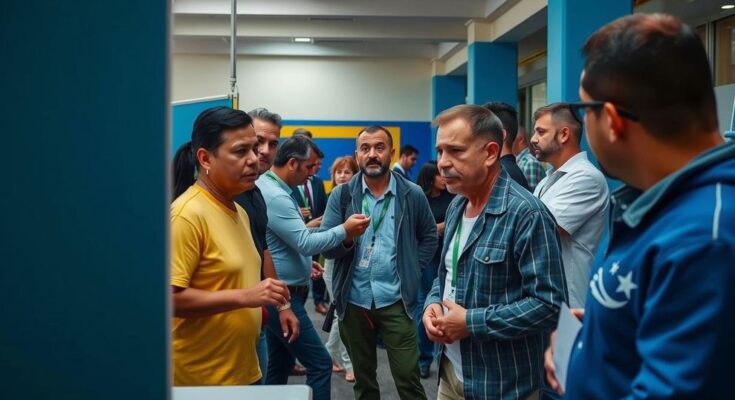Uruguayans are participating in a presidential run-off between leftist candidate Yamandu Orsi and right-wing Alvaro Delgado. Former President Jose Mujica’s Broad Front aims to reclaim power after five years of conservative rule. Opinion polls indicate a closely contested election, with significant emphasis on addressing economic concerns as voters navigate their choices amid political transitions.
Voting has commenced in Uruguay’s presidential run-off election, presenting voters with a choice between the leftist candidate Yamandu Orsi from the Frente Amplio (Broad Front) and right-wing candidate Alvaro Delgado of the National Party. Former President Jose “Pepe” Mujica’s Broad Front seeks to reclaim power after five years under a right-wing administration led by President Luis Lacalle Pou. Polls indicate a closely contested race, with under 25,000 votes possibly differentiating the two frontrunners. The elections are notable for their relatively low tension between political factions, in contrast to other Latin American countries.
The election process began at 8:00 AM (11:00 GMT) and will conclude at 7:30 PM (22:30 GMT), with initial results anticipated shortly after polls close. President Lacalle Pou, despite a 50 percent approval rating, faces criticism over rising crime rates amid advancements in employment and salary levels. The potential for a tight electoral outcome has prompted candidates to seek the support of voters from smaller, unaffiliated parties, as well as those who did not participate in the initial round of voting.
Uruguay, a nation with a population of approximately 3.4 million, is currently undergoing a significant electoral process marked by a run-off election for the presidency. The year has seen increasing political interest, with the election acting as a reflection of the broader sentiment across Latin America, where economic challenges such as inflation and living costs are influencing voter preferences. The political landscape in Uruguay is characterized by its relatively moderate tone, allowing for tangible intersections between the left and right political groups, which distinguishes it from the more polarized environments of neighboring countries. In the initial round of voting, candidates Orsi and Delgado garnered 43.9 percent and 26.8 percent, respectively, aligning with endorsements from various political factions to consolidate their voting bases. However, both candidates face pressures to maintain a workable policy approach that aligns with the electorate’s expectations, particularly in light of prevailing economic concerns.
The presidential run-off in Uruguay epitomizes a critical choice for voters between two distinct political alignments, with the prospect of a leftist resurgence under Yamandu Orsi and the opportunity for the right to maintain its grip on power through Alvaro Delgado. As the election unfolds, the responsiveness of candidates to the electorate’s needs, particularly regarding fiscal challenges, could significantly inform the result. The overall context of the elections highlights a comparative lack of volatility within Uruguay’s political sphere, suggesting potential stability regardless of the outcome.
Original Source: www.aljazeera.com




